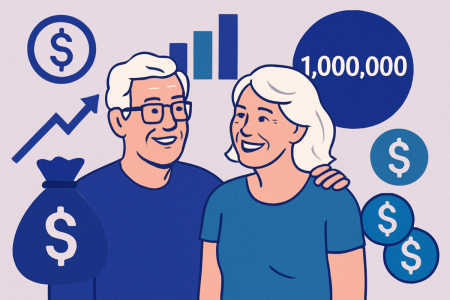Million-dollar retirement? Here's why it’s not actually a must-have
- Replies 15
You may have heard that you must squirrel away a cool $1,000,000 in super to retire comfortably. It’s a catchy headline that keeps popping up – even Yahoo Finance ran a piece titled something like “$1M in super is not a magic number.”
But here’s the truth: that “million-dollar” figure is more myth than magic for most Australians. In reality, official data and financial experts show many retirees can live well on far less, especially when you factor in the Age Pension. A one-size-fits-all golden number simply doesn’t exist.
In plain English: retirement planning isn’t about hitting an arbitrary target. It’s about your lifestyle goals and income needs.
As CareSuper planner Dan Bridgland puts it, “How much super you need is a result of the lifestyle that you want to live”. In other words, the real question is what kind of retirement you want – not how many zeros are in your bank balance.
The “$1M” mantra got started because round numbers grab headlines, but as a new wave of research confirms, you usually don’t need a seven-figure nest egg to retire in comfort.
Let’s look at what the numbers actually say: official studies by Australia’s super funds and tax office, plus commentary from financial pros. Spoiler alert – the figures paint a very different picture than the $1,000,000 myth.
From these figures you can see why experts shake their heads at the $1M scare. It’s not that having $1M is bad – of course more savings gives more options – but it certainly isn’t a universal “magic” threshold. Industry veterans like Craig Sankey of Industry Fund Services note that ASFA’s actual benchmarks are far lower.
He says: “Take those ASFA numbers: [it] says you would need $690,000 as a couple [about $345k each], whereas [as] a single person, $595,000… it’s quite a bit extra for [a] single”. In other words, comfortably retiring on $1M per person is not what ASFA predicts – they show a couple can do it on about $690k together.
AustralianSuper – the big industry fund – sums it up bluntly: “You may have heard you need $1 million [to retire] – it’s the figure that’s often thrown around… But the truth is, there’s no one-size-fits-all. A comfortable retirement will look different for everyone”. And Dan Bridgland’s point is spot-on: start by asking how much income you actually want in retirement, not fixating on a round savings goal.
A lovely overseas holiday or extra grandchildren support? Figure out its cost, and work backwards. (Hint: in many cases that cost is far below $1M.)
The media hype about $1M often ignores these nuances. It also glosses over how super grows. As one financial commentator noted, people sometimes “take super savings, divide by years, and think that’s their future income,” but forget that the balance can keep growing if only moderate withdrawals are taken.
In practice, a well-managed $690k balance can yield ~$34k a year (at a conservative 5%), on top of pension income, giving much more flexibility than the simple math suggests.
So what about those who worry $1M is still “not enough” for the lifestyle they imagine? Well, sure – if you envision flying first class every week, dining at five-star restaurants daily, and paying for every whim, you might run through a million in no time. But even then, experts point out you don’t need all that saved in advance. Part of the joy of retirement is a more relaxed budget.
Living below your means or taking calculated risks with your investments can stretch your dollars. For example, a couple with $405k in super and a full pension can afford about $58,000 a year to spend. With that, they can still enjoy decent travel and outings, even if it’s not an extravaganza.
The bottom line is this: in planning for life after work, focus on the life, not the number. What kind of daily routine and leisure do you want? How many cruises? What car? That determines your spending. Then figure out how much you can get from the pension, from downsizing your home (if needed), and from your super withdrawals. You’ll often find a million isn’t a requirement but an aspiration, and one that gives you even more comfort and security if you reach it.
As financial writer Peter Switzer noted about the Super Consumers analysis: a million dollars does provide comfort and peace of mind – you’d never have to worry about running out or taking risks. But many retirees manage quite well on significantly less by being prudent with their spending.
Even official retirement calculators reflect this. For instance, ASIC’s MoneySmart explains that a couple on $690k at 6% yields about $41,400 a year, plus a $43,753 pension – more than the $73,077 needed. And interestingly, ASFA’s own standard for modest living assumes people could live on just $100k in savings with pension help.
That’s why the “million-dollar retirement” is something of a journalism trope: it makes an eye-catching headline, but it misses the fact that nearly 80% of retirees have much less saved and still get by (often with the help of the Age Pension).
Financial planners therefore advise: instead of fixating on a magic number, make a budget. List your actual or desired expenses – food, bills, travel, gifts – and project what your pension will cover. Then the gap is what you need from super.
For example, if you want $50k a year (a common comfortable budget for a single older person), and the Age Pension covers, say, $30k, you only need $20k a year extra. At 5%, that means roughly $400k in super. (Still high, but far below $1M.)
Here are some key figures from trusted sources to keep in mind:
All this evidence strongly indicates that $1 million isn’t some magical threshold you have to clear. It’s understandable why the myth arose: it’s simple and dramatic. But as you plan your future, remember it’s your retirement. Talk to a financial adviser if you can, plug your numbers into retirement calculators (including government ones like SmartSave or ASIC’s), and don’t let one big round figure scare you.
As one advisor put it, the focus should be on income streams and spending needs, not an arbitrary target.
At the end of the day, what really matters is your peace of mind and the lifestyle you want to enjoy. That might mean aiming for a higher balance if you love to travel, or it might mean being content with more modest means. The real magic is in planning carefully, not in hitting a single benchmark.
So, if $1,000,000 isn’t the magic bullet, what is the right number for you? Will you chase a round figure because of the hype, or will you decide your retirement goals based on your own life plans – and let your super savings reflect that? How would you answer that question?
But here’s the truth: that “million-dollar” figure is more myth than magic for most Australians. In reality, official data and financial experts show many retirees can live well on far less, especially when you factor in the Age Pension. A one-size-fits-all golden number simply doesn’t exist.
In plain English: retirement planning isn’t about hitting an arbitrary target. It’s about your lifestyle goals and income needs.
As CareSuper planner Dan Bridgland puts it, “How much super you need is a result of the lifestyle that you want to live”. In other words, the real question is what kind of retirement you want – not how many zeros are in your bank balance.
The “$1M” mantra got started because round numbers grab headlines, but as a new wave of research confirms, you usually don’t need a seven-figure nest egg to retire in comfort.
Let’s look at what the numbers actually say: official studies by Australia’s super funds and tax office, plus commentary from financial pros. Spoiler alert – the figures paint a very different picture than the $1,000,000 myth.
- ASFA “comfortable” standard: Official superannuation benchmarks by ASFA (the peak super industry body) show that a couple only needs about $690,000 in today’s dollars for a comfortable retirement, and a single person about $595,000. That assumes you’ll also draw a part Age Pension. In other words, even at the high end, the shortfall from the Age Pension is much less than $1M.
- ASFA “modest” standard: Believe it or not, for just a basic modest retirement lifestyle ASFA says you need only about $100,000 (for either a couple or single) at age 67 – because the Age Pension covers the rest. This shows how wildly above necessity the $1M figure really is for most people.
- ASFA budget figures: To put it another way, a comfortable couple’s budget is around $73,077 a year. Yet a full Age Pension for a couple (with supplements) is about $43,753 a year. So half of that comfortable lifestyle budget is already met by the pension. The extra $30–$35k per year needs to come from super – which is why a ~$690k lump sum (drawing ~5% annually) works out under ASFA’s math.
- Real spending examples: The notion of a one-million-dollar magic bean falls apart when you look at actual retiree spending. Research by consumer advocates (“Super Consumers Australia”) sorts retirees into spending tiers and finds crazy low targets. For example, if a single retiree can live on only $34,000 a year, they’d need just $88,000 in super; a couple living on $48,000 needs $111,000. Even those wanting moderate lifestyles ($44k single/$64k couple) only need about $301k/$402k. And only the highest spenders ($55k single/$88k couple per year) need roughly $745k (single) or $1,003,000 (couple) – and the latter figure is for a fairly lavish $88k/year lifestyle. These spending-based buckets (from recent Australian analysis) show that millions are only needed for unusually high living costs.
- Typical super balances: In real life, most Australians retiring have far below $1M anyway. The median super balance for people aged 60–64 is only about $212,000 for men and $159,000 for women. Even if markets have bumped those a bit since the data, it’s nowhere near a million. As an ASFA update noted, back in 2019 the median balance at 60–64 was ~$179k (men) and ~$137k (women). In short, 75–80% of people nearing retirement have under $500k in super, let alone $1M.
- Age Pension boost: Don’t forget the super safety net. As one retirement blog pointed out, if a retired couple has ~$405,000 in super, they actually qualify for a full pension (about $38,709 in 2022). Combined with even modest super drawdowns, they could have ~$58k/year tax-free to live on. That’s roughly ASFA’s comfortable standard – without needing seven figures saved. In short, the government pension closes the gap dramatically.
From these figures you can see why experts shake their heads at the $1M scare. It’s not that having $1M is bad – of course more savings gives more options – but it certainly isn’t a universal “magic” threshold. Industry veterans like Craig Sankey of Industry Fund Services note that ASFA’s actual benchmarks are far lower.
He says: “Take those ASFA numbers: [it] says you would need $690,000 as a couple [about $345k each], whereas [as] a single person, $595,000… it’s quite a bit extra for [a] single”. In other words, comfortably retiring on $1M per person is not what ASFA predicts – they show a couple can do it on about $690k together.
AustralianSuper – the big industry fund – sums it up bluntly: “You may have heard you need $1 million [to retire] – it’s the figure that’s often thrown around… But the truth is, there’s no one-size-fits-all. A comfortable retirement will look different for everyone”. And Dan Bridgland’s point is spot-on: start by asking how much income you actually want in retirement, not fixating on a round savings goal.
A lovely overseas holiday or extra grandchildren support? Figure out its cost, and work backwards. (Hint: in many cases that cost is far below $1M.)
The media hype about $1M often ignores these nuances. It also glosses over how super grows. As one financial commentator noted, people sometimes “take super savings, divide by years, and think that’s their future income,” but forget that the balance can keep growing if only moderate withdrawals are taken.
In practice, a well-managed $690k balance can yield ~$34k a year (at a conservative 5%), on top of pension income, giving much more flexibility than the simple math suggests.
So what about those who worry $1M is still “not enough” for the lifestyle they imagine? Well, sure – if you envision flying first class every week, dining at five-star restaurants daily, and paying for every whim, you might run through a million in no time. But even then, experts point out you don’t need all that saved in advance. Part of the joy of retirement is a more relaxed budget.
Living below your means or taking calculated risks with your investments can stretch your dollars. For example, a couple with $405k in super and a full pension can afford about $58,000 a year to spend. With that, they can still enjoy decent travel and outings, even if it’s not an extravaganza.
The bottom line is this: in planning for life after work, focus on the life, not the number. What kind of daily routine and leisure do you want? How many cruises? What car? That determines your spending. Then figure out how much you can get from the pension, from downsizing your home (if needed), and from your super withdrawals. You’ll often find a million isn’t a requirement but an aspiration, and one that gives you even more comfort and security if you reach it.
As financial writer Peter Switzer noted about the Super Consumers analysis: a million dollars does provide comfort and peace of mind – you’d never have to worry about running out or taking risks. But many retirees manage quite well on significantly less by being prudent with their spending.
Even official retirement calculators reflect this. For instance, ASIC’s MoneySmart explains that a couple on $690k at 6% yields about $41,400 a year, plus a $43,753 pension – more than the $73,077 needed. And interestingly, ASFA’s own standard for modest living assumes people could live on just $100k in savings with pension help.
That’s why the “million-dollar retirement” is something of a journalism trope: it makes an eye-catching headline, but it misses the fact that nearly 80% of retirees have much less saved and still get by (often with the help of the Age Pension).
Financial planners therefore advise: instead of fixating on a magic number, make a budget. List your actual or desired expenses – food, bills, travel, gifts – and project what your pension will cover. Then the gap is what you need from super.
For example, if you want $50k a year (a common comfortable budget for a single older person), and the Age Pension covers, say, $30k, you only need $20k a year extra. At 5%, that means roughly $400k in super. (Still high, but far below $1M.)
Here are some key figures from trusted sources to keep in mind:
- ASFA comfortable retirement – about $690,000 (couple) or $595,000 (single) in super.
- ASFA modest retirement – only about $100,000 in super (for either a single or a couple).
- Typical budgets – a couple needs ~$73,077/year for comfort, while the full couple pension is ~$43,753 (so super must supply ~29k/year).
- Real retiree spending – research shows a $34k/year lifestyle needs only ~$88k (single) / $111k (couple) in super, whereas a high-end $88k/year lifestyle needs ~$1,003k (couple).
- Median Aussie super – roughly $212k (men) and $159k (women) at age 60–64, meaning most people are nowhere near $1M.
All this evidence strongly indicates that $1 million isn’t some magical threshold you have to clear. It’s understandable why the myth arose: it’s simple and dramatic. But as you plan your future, remember it’s your retirement. Talk to a financial adviser if you can, plug your numbers into retirement calculators (including government ones like SmartSave or ASIC’s), and don’t let one big round figure scare you.
As one advisor put it, the focus should be on income streams and spending needs, not an arbitrary target.
At the end of the day, what really matters is your peace of mind and the lifestyle you want to enjoy. That might mean aiming for a higher balance if you love to travel, or it might mean being content with more modest means. The real magic is in planning carefully, not in hitting a single benchmark.
So, if $1,000,000 isn’t the magic bullet, what is the right number for you? Will you chase a round figure because of the hype, or will you decide your retirement goals based on your own life plans – and let your super savings reflect that? How would you answer that question?









